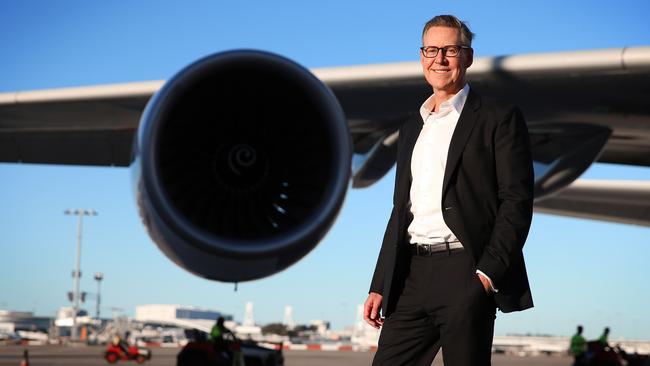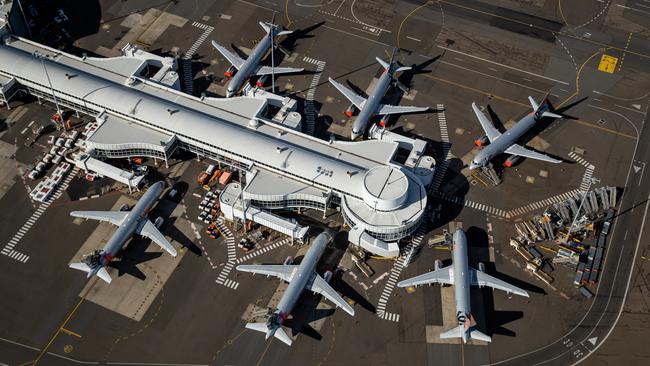Sydney Airport a rare prize for cashed-up super funds

We can argue about price, but one thing is clear: Covid-19 will pass.
And because of its size and its expected performance over the remaining 76 years of the lease, Sydney Airport is a rare prize for the cashed-up industry fund managers behind the Sydney Aviation Alliance.
Running below the radar, however, is a niggling concern with these sorts of takeovers. By taking big public companies private and holding more large private assets, industry funds could create a headache for regulators — ironically one that regulators have helped develop.
The Sydney Airport board comes through this process with its reputation intact.
The consortium upped the bid twice, from $8.25 to $8.75 a stapled unit, a rise of 6 per cent. There was talk that the bidder might walk away. Then in mid-August AustralianSuper, one hope for an alternate bid, joined forces with the consortium. The board seems comfortable that at least 75 per cent of shareholders will vote in favour of the scheme of arrangement.
That said, the consortium members are unlikely to have been very price sensitive on this occasion.
In rough billions the Sydney Aviation Alliance members and funds under management are: IFM $170bn, UniSuper $100bn, QSuper (about to merge with SunSuper) $200bn, and AustralianSuper $220bn. The international member, Global Infrastructure Partners has $100bn under management.
Together these funds manage almost $800bn: investment demanding a return.
In recent years and despite Covid-19, that return has on the whole been impressive.
To secure an asset like Sydney Airport in a $23.6bn deal which offers the country’s largest airport business, a retailing enterprise and major property development and logistics upside over the next three quarters of a century is a small coup.
Going forward, industry funds need quality long-term, high-return assets. They represent billions of dollars in retirement savings of many Australians and they are growing fast.
Sydney Airport chief executive Geoff Culbert and his team have done well to position the company.
There is plenty of cash after a big equity raising, low cash burn with a focus on costs and a new round of leases locked in with top retail brands. And Culbert is moving ahead on property development and wants to target the rising e-commerce driven freight business.
The airport reported a $97m half-year loss in August, but Culbert spoke to how well the airport bounced back in the window before Sydney’s lockdowns. Some shareholders cried foul that the Sydney Aviation Alliance was being blatantly opportunistic by looking to snatch a bargain when the airport was shuttered. Another 50c seems to have settled the matter.
There is other hidden value for the industry funds. By taking the airport as a private asset, not a listed one, the funds no longer have to mark to market their investment. Instead they simply report the value of the asset which while audited is a process in their hands. It means that year-on-year volatility can be smoothed.
Amassing private assets does have its downside, however, and it goes to risk, which should concern regulators.

All superannuation funds have now been put under a new performance regime by regulator APRA. Thirteen have been named and shamed for poor performance and a million Australians will receive letters suggesting they change funds as a result.
This performance pressure from APRA is encouraging the merger of small industry super funds which the regulator favours. It is also encouraging quite large funds to merge, like QSuper and SunSuper, because scale helps deliver returns.
But if Australia ends up with a few jumbo industry funds with a very large proportion of investment in private assets, the regulator may find itself with a liquidity issue.
Under APRA’s test, if a fund underperforms and members are prompted to leave, taking their investments, it may need to liquidate assets fast. Selling listed stock is easy. Selling private assets fast can be much harder.
The top industry funds have been rightly acknowledged as outclassing retail funds on performance. Three of APRA’s top 10 best performers were AustralianSuper, UniSuper and QSuper Lifetime.
Yet even with the bigger or better managed funds, doesn’t the shift to private assets concentrate risk? In the case of a $23.6bn airport asset, what if climate change or another wicked Covid-19 strain decimates air travel for years?
Put bluntly, is it the case now that industry funds are being incentivised to hold private assets by the regulator because of the higher returns these assets may promise, but that this might not be in the longer-term interest of members?
It is worth thinking about because this is trend is taking off.
Public company boards are alert to the latest modus operandi of a 15 per cent industry fund investor in the event of a takeover. In the Healthscope takeover it was AustralianSuper; in Sydney Airport, it is UniSuper. These funds have aligned themselves during the takeover talks with the bidder, and their investment is carried over into the new ownership structure. They argue that by recusing themselves from voting there is no conflict of interest – but they can be vocal during the process in favour of the bid while having little interest in a higher offer price.
The market and regulators appear to have accepted this strategy going forward. But as the private veil cloaks more assets, industry super is under pressure to do more to demonstrate that they are always member first. Will a Sydney Airport in private hands continue to produce a publicly available ESG report on sustainability?
The takeover is not yet a done deal but shares in Sydney Airport rose over 4 per cent on Monday in anticipation. No doubt the consortium would like to expedite the process, if only because the board is still open to offers during due diligence. Small as the risk is of a counter bid above $23.6bn, lunches have been cut before.
Then there are the optics of a possibly busy airport ahead of the shareholder scheme of arrangement vote. Australians are booking up international flights out of Sydney Airport in January, having been told only months ago that they would need to wait until mid-2022. This will have been factored into the board’s decision on the new price of $8.50 but the media will have fun.
This is not a five-week exercise, however: negotiating a nondisclosure agreement, hopping into the data room for four weeks and deal sealed. The biggest drag on execution is probably FIRB and the ACCC, which will look at the deal closely. Exactly how the Sydney Aviation Alliance has constructed its bid to avoid competitive issues of members with interests in other airports is not public but it is a safe bet that the smartest minds will have put a lot of effort into placating the regulators.





The decision by David Gonski and his board to recommend the sale of Sydney Airport for cash, valuing it at around $23.6bn, is set to take a top 50 company off the boards of the ASX.